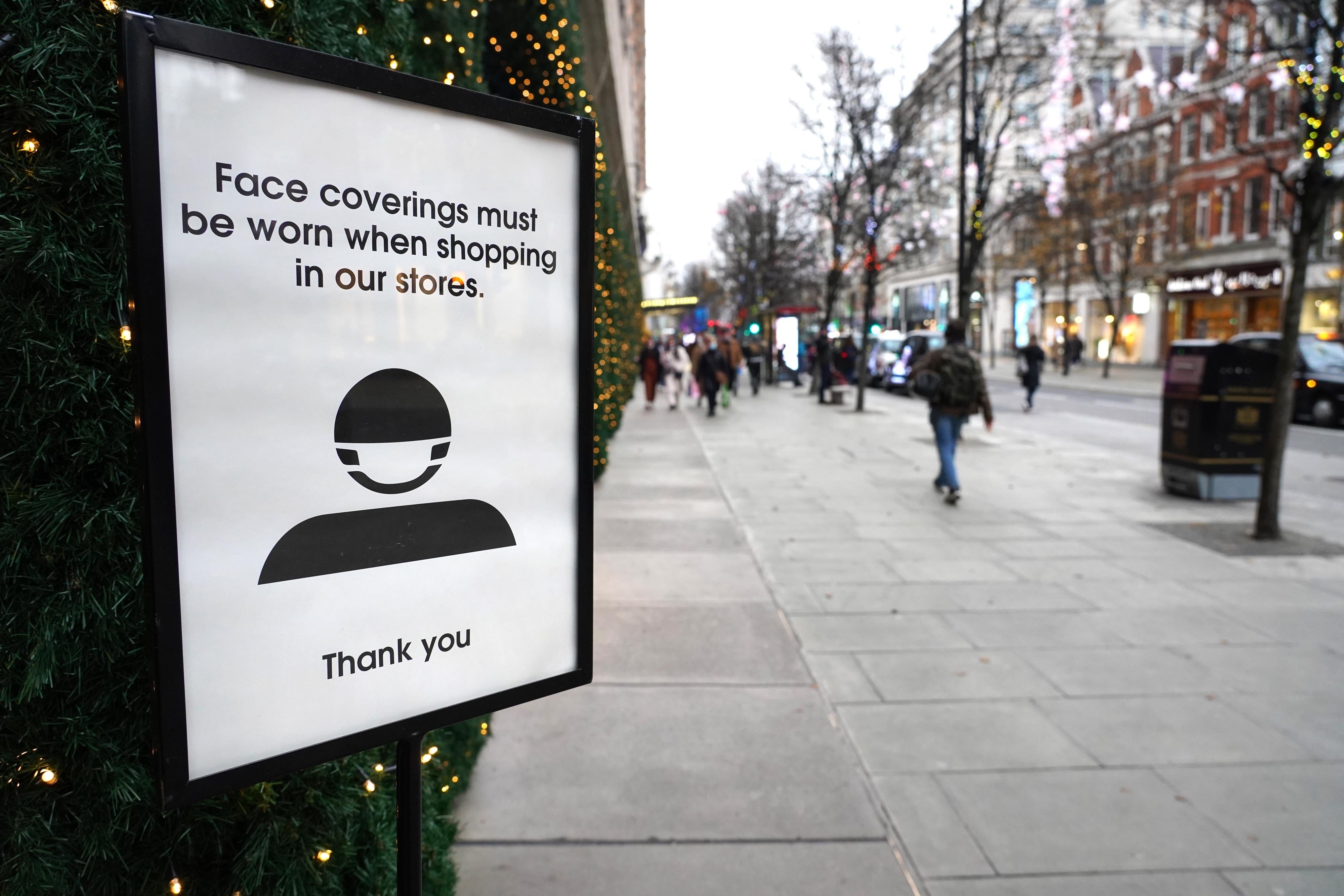Omicron takes toll on retailers on last weekend before Christmas
Oxford Street was quieter than usual on Saturday, with industry chiefs calling for more support.

Your support helps us to tell the story
From reproductive rights to climate change to Big Tech, The Independent is on the ground when the story is developing. Whether it's investigating the financials of Elon Musk's pro-Trump PAC or producing our latest documentary, 'The A Word', which shines a light on the American women fighting for reproductive rights, we know how important it is to parse out the facts from the messaging.
At such a critical moment in US history, we need reporters on the ground. Your donation allows us to keep sending journalists to speak to both sides of the story.
The Independent is trusted by Americans across the entire political spectrum. And unlike many other quality news outlets, we choose not to lock Americans out of our reporting and analysis with paywalls. We believe quality journalism should be available to everyone, paid for by those who can afford it.
Your support makes all the difference.Concerns over the soaring rates of Covid-19 driven by the spread of Omicron variant are keeping many shoppers away from central London on what is usually the busiest weekend of pre-Christmas trading.
Oxford Street the capital’s flagship shopping destination, was noticeably quieter on Saturday than during the bustling festive period in pre-pandemic times.
While online sales are booming and retail parks that can be reached by car have been busy, city centres have seen a marked drop in footfall, according to trade groups including the British Retail Consortium.
Its chief executive Helen Dickinson said: “The rise of the Omicron variant, combined with the Government’s work-from-home advice, has resulted in fewer people visiting shops and high streets, particularly in large city centres.
“There has already been a gargantuan effort to ensure that essential food and gifts are ready for the festive season, despite ongoing challenges in the supply chain.
“We are confident it can be a great Christmas for consumers, and retailers are pulling out the stops to keep staff and customers as safe as possible during these difficult times.”
Outlets in London’s West End are unlikely to see a last-minute spending rush this weekend, according to the New West End Company, which represents retailers, restaurants and businesses in the area.
On Thursday, the most recent data available, customer traffic around Bond Street, Oxford Street and Regent Street dipped by seven percentage points from the previous week, and was 32 percentage points below the same day in 2019.
The company’s chief executive, Jace Tyrrell, said: “With rising Covid cases dampening consumer confidence and a planned Tube strike looming on Saturday, we’re anticipating a muted final weekend of Christmas trading at a time when West End businesses should be enjoying a much needed boost.”
He joined calls for the Government to provide temporary financial support to leisure businesses hit by new Covid restrictions.
The rules, imposed by Boris Johnson on December 9 to curb the spread of the Omicron variant, include working from home guidance and vaccine passports for some venues.
The weeks before Christmas are typically the busiest period for pub and restaurant operators but they have faced a wave of cancellations and staff illness.
Mike Cherry, national chair at the Federation of Small Businesses, said: “With the number of Covid cases soaring, many small businesses, particularly in the hospitality sector, are coming under a huge amount of strain as consumer demand drops and the number of people self-isolating rises.
“This crucial festive trading period should be a busy, bustling time of the year, yet in the face of the new variant, many restaurants, bars and hotels are half empty.”
He said Government support is “crucial”, a comment echoed by Hannah Essex, co-executive director of the British Chamber of Commerce.
Speaking on BBC Breakfast, she said: “What we need to hear pretty much now, over the weekend, which should have been one of the busiest weekends of the year for businesses, is what are they going to do. Doing nothing is not an option right now… or we will see businesses fail.
“(Businesses have) used up cash reserves, their costs are going up quite dramatically because of the massive surge in inflation, and suddenly at the time that should have been the time which would help them through into next year, their customers have just disappeared.”
Ms Essex gave an example of a museum in Surrey that had “lost £80,000 this month already” and a hotel in Swindon that was “looking at a £400,000 loss”.
She said: “The last 20 months have been absolutely brutal for this sector. They were just starting to see things pick up and this is the point at which we could see them fall over the edge… and will inevitably lead to job losses as well.”
She said the Treasury “heard what we have to say” after industry leaders met with officials and Chancellor Rishi Sunak on Friday, adding: “We don’t want to see further restrictions – businesses want to be able to continue to trade and welcome customers back in the new year – but if there are restrictions, there has to be a package of support to go with it.”